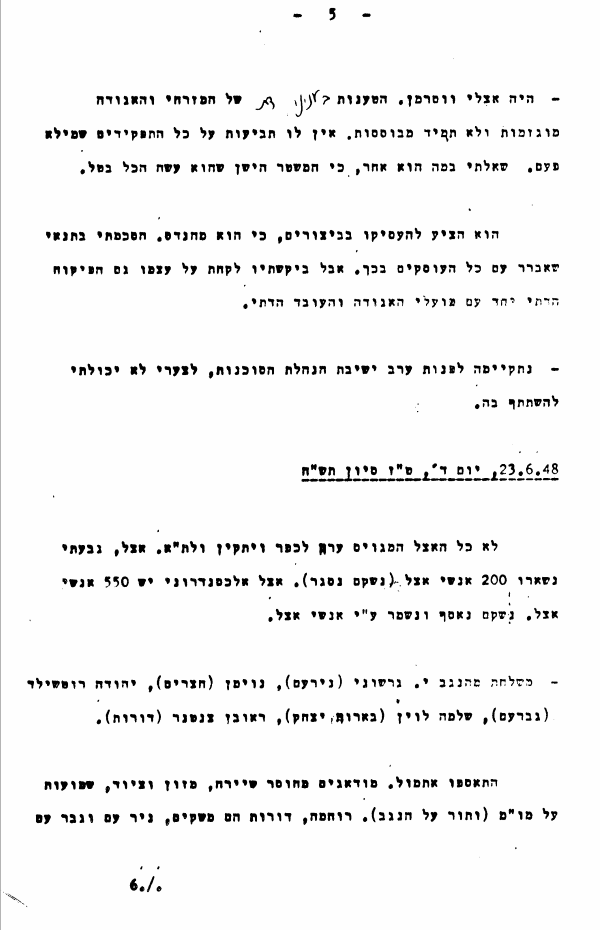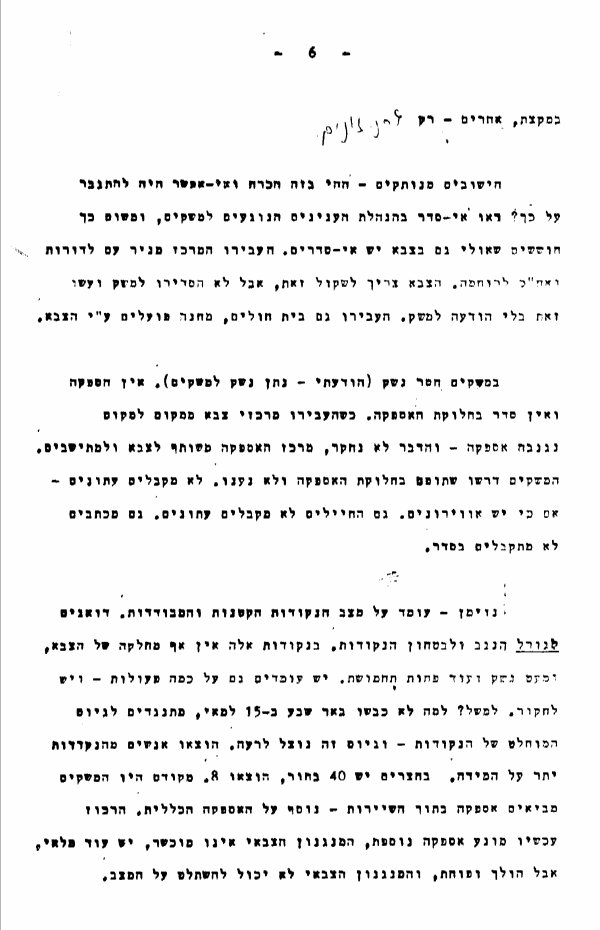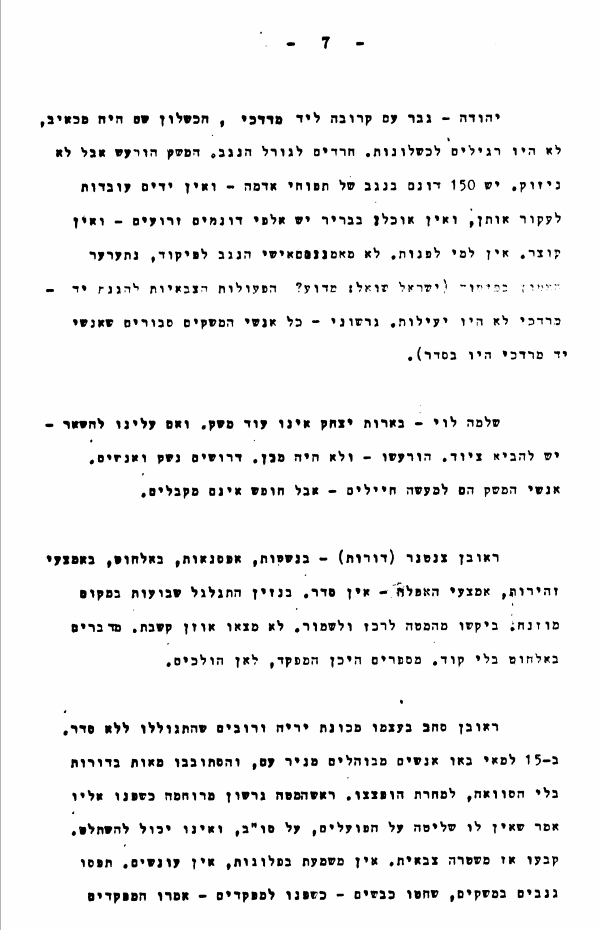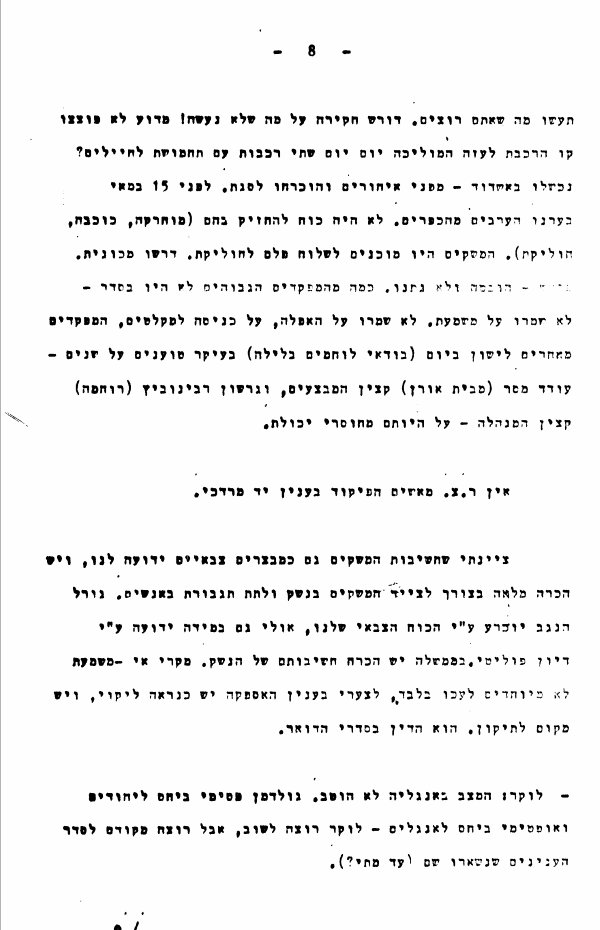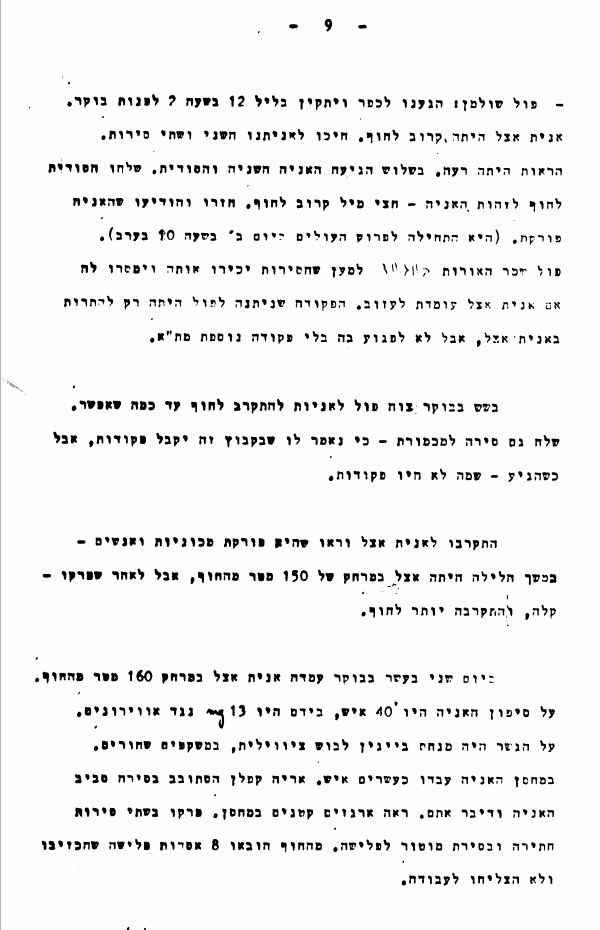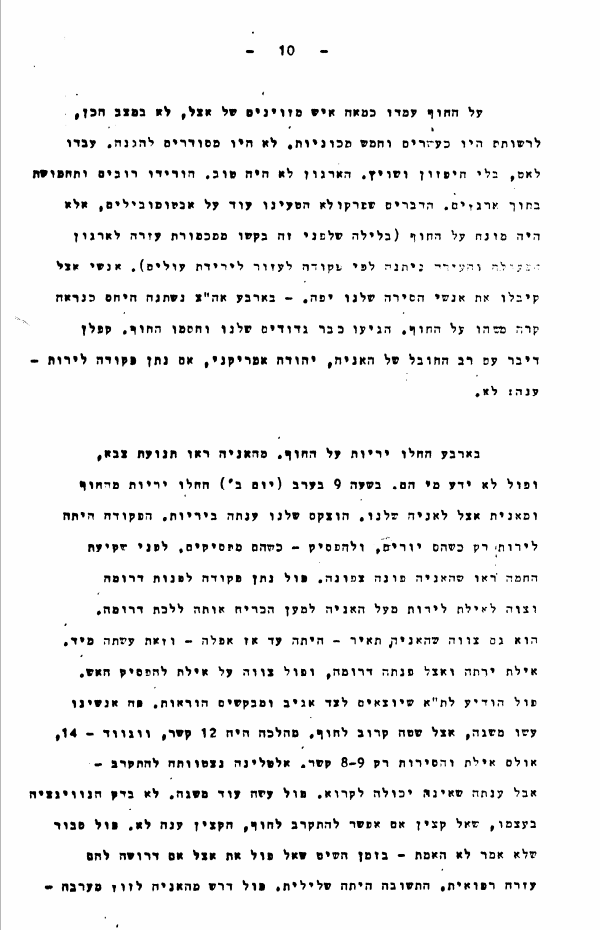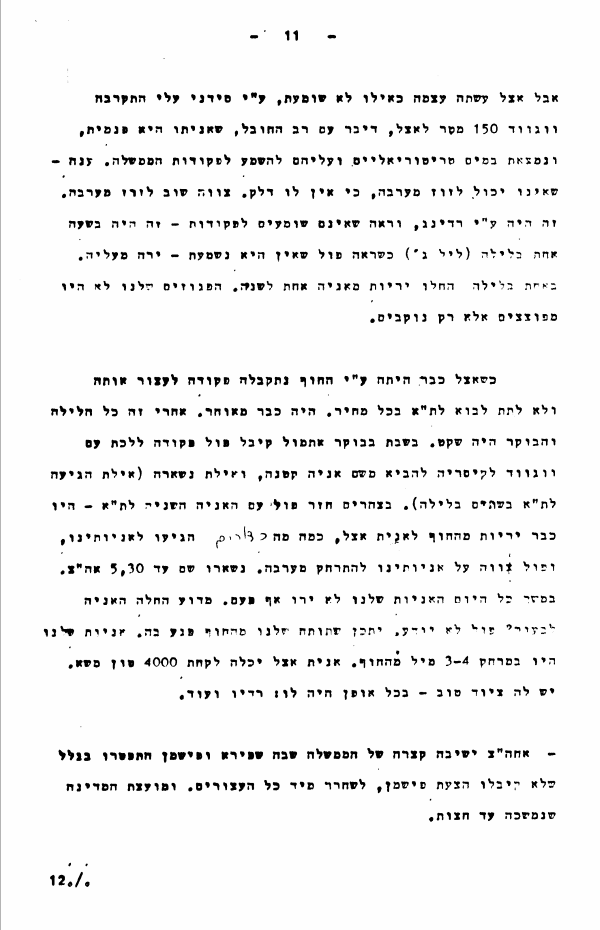1
of
Places:
Gvar'am
Dorot
Burayr
Isdud
Gaza
Bet Oren
Hulayqat
Kawkaba
England
London
Mikhmoret
The use of the photograph is subject to the Copyright Law, 2007
22.06.1948
225401
{P001} {0161-05}Wednesday, June 23, 1948 Not all of the ETZEL members who enlisted [in the IDF] deserted to Kefar Vitkin or Tel Aviv. There are still 200 ETZEL men in Givati (their weapons were turned over). Alexandroni has 550 ETZEL men. Their weapons were collected and are being kept by ETZEL men. – A delegation from the Negev: [Zvi] Guershoni (Nir-Am), [Walter] Neumann [sp.] (Hatzerim), Yehuda Rothschild (Gvar’am), Shlomo Levin (Be’erot Yitzhak), Reuven Zentner [sp.] (Dorot). They met yesterday, concerned about the lack of convoys, food, and equipment, and rumors about negotiations (relinquishing the Negev). Ruhama [and] Dorot are settlements, Nir-Am and Gvar’am partial [settlements] [because of the concentration of conscripts there], others – only garrison forces. The settlements are cut off – was this necessary and insurmountable? [In the past] they’ve seen mismanagement of matters related to the settlements, and are therefore concerned that there may be mismanagement in the army as well. They transferred the center [Negev Brigade headquarters] from Nir-Am to Dorot and then to Ruhama. The army needs to consider this [has its own considerations] but they didn’t provide the settlement with an explanation, and they did this without informing the settlement. They also transferred a hospital [and] an army workers’ camp. The settlements lack weapons (I informed them that we’ll give the settlements weapons), there are no supplies, and no order in the allocation of provisions. When they transferred army centers from one place to another, supplies were stolen – and the matter wasn’t investigated. The supply center [in the Negev] is shared by the army and the settlers. The settlements demanded that they be included in the allocation of supplies and received no answer. They don’t receive newspapers – even though there are airplanes. The soldiers don’t receive newspapers either, or letters in an orderly way. Neumann [Hatzerim]: Regarding the situation in small, isolated outposts. They’re concerned about the fate of the Negev and the security of the outposts. These outposts have no platoon from the army, few weapons, and even less ammunition. There are also questions concerning a few operations – which should be investigated. [Ben-Gurion]: Such as? [Neumann]: Why wasn’t Beersheva conquered on May 15? They oppose the categorical conscription of the outposts – because this conscription has been exploited. Too many men were pulled away from the outposts. Hatzerim has 40 young men, 8 were pulled out. Previously the settlements would bring supplies in convoys – in addition to the general provision of supplies. Now the concentration [of supplies for military and civilian needs in one location] is hampering the provision of additional supplies [that cannot be sent to the front], the military apparatus [personnel] is not trained; there’s still stock but it’s diminishing and the military apparatus isn’t able to control the situation. Yehuda [Rothschild]: Gvar’am is near Yad Mordechai; the failure [defeat] there was painful, they weren’t used to failing. They fear for the fate of the Negev. The settlement was shelled but not damaged. There are 150 dunams of potatoes in the Negev – and no one is picking them, and there’s no food. In Burayr [near Bror Hayil] there are thousands of dunams that have been sown – and no harvesting. There’s no one to turn to. The Negev people don’t believe the Command. Faith in the Command has been undermined. (Yisrael [Galili] asks: Why? [Y. Rothschild]: The military operations to defend Yad Mordechai were not effective. Guershoni: All the people in the settlements were certain that the Yad Mordechai people were okay.) Shlomo Levin – Be’erot Yitzhak is no longer a settlement, and if we are to stay – equipment has to be brought in. They were shelled – and there was no defense. They need weapons and men. The settlement’s men are in effect soldiers – but they get no leave. Reuven Zentner (Dorot): In terms of armament, logistics, wireless [communication], safety measures, blackout measures – there’s no order. Petrol was scattered about for weeks in some wasteland area. They asked the [military] staff to collect and watch over [it], couldn’t get anyone to listen. They talk on the wireless without codes: discuss where the Command is, where they’re going. Reuven himself dragged [retrieved] a [heavy] machine gun and rifles that were haphazardly strewn about. On May 15 people arrived terrified from Nir-Am [after the place was shelled, when the headquarters moved to Dorot], and hundreds were wandering around Dorot, without camouflage. On the following day they were bombed. The head of staff [administrative officer] Gershon [Rabinowitz] [sp.] from Ruhama, when approached, said that he has no control over the workers, over SB [Solel Boneh], and cannot take charge. So they established a military police. There’s no discipline in the [military] companies, no punishment. They caught thieves in the settlements [who were] slaughtering sheep – when they approached the commanders the commanders said: “Do what you want.” He demands an investigation into what wasn’t done: Why didn’t they bomb the railway line to Gaza, which allows two trains with ammunition and soldiers to arrive on a daily basis? They failed in Ashdod – because of delays, and were forced to retreat. Before May 15 we drove the Arabs out of the villages, and didn’t have the forces to hold them (Muharraqa, Kawkaba, Hulayqat). The settlements were prepared to send a combat patrol [trained fighters from the garrison force] to Hulayqat. They requested a vehicle [with] a PIAT – which was promised but not delivered. Some of the high-ranking commanders were not okay – didn’t maintain discipline, didn’t maintain blackout, entry into [use of] bomb shelters. The commanders sleep late during the day (presumably they’re fighting at night). They’re primarily complaining about two – Oded Messer (from Bet Oren), operations officer, and Gershon Rabinowitz (Ruhama), administrative officer – for being incapable. Reuven Zentner doesn’t blame the Command for Yad Mordechai. I noted that we are aware of the settlements’ importance for military operations as well, and we fully recognize the need to equip them with weapons and give them reinforcements. The fate of the Negev will be decided by our military power. Maybe also to some extent by political discussion. The importance of the weaponry [evidently should be – the Negev] is recognized within the government. Incidents involving lack of discipline are not unique to the Negev. As for supplies, unfortunately there appears to be a malfunction that needs to be fixed. The same holds for postal arrangements. – Berl [Locker, Jewish Agency Executive member in London]: The situation in England hasn’t improved. [Nahum] Goldmann is pessimistic about the Jews, and optimistic about the English. Locker wants to return [to Israel], but first he wants to sort out the remaining issues over there (until when?). – Paul Shulman [naval commander of the Wedgwood who led the operation against the Altalena]: We reached Kefar Vitkin on Monday night, at 2 a.m. The ETZEL ship was near the shore. We waited for our second ship and two boats. Visibility was bad. At three the second ship [the Israeli naval ship Eilat] and boats arrived. The boats were sent to shore to identify the ship – half a mile offshore. They returned and reported that the ship was being unloaded (it had begun to unload immigrants on Monday [in fact, on Sunday, June 20] at 10 p.m.). Paul kept the Wedgwood lights [on] so that the boats would recognize it and report to it if the ETZEL ship was about to depart. The order given to Paul was only to warn the ETZEL ship, but not to harm it unless another order came from Tel Aviv. At 6 a.m. Paul ordered the ships to approach the shore as much as possible. He also sent a boat to Mikhmoret – because he’d been told that he would receive orders at this kibbutz, but when he arrived there – there were no orders. They drew near the ETZEL ship and saw that it was unloading vehicles and people – during the night the ETZEL [ship] was at a distance of 150 m from the shore, but after being unloaded – [it was] light[er], and drew nearer to the shore. At 10 a.m. on Monday the ETZEL ship stood 100 m offshore. There were 40 men on the ship’s deck holding anti-aircraft MG-13s [Hotchkiss heavy machine guns]. On the bridge was Menachem Begin in civilian clothing, with black glasses. There were about twenty men at work in the ship’s hold. [Israeli naval officer] Aryeh Kaplan circled the ship in a boat and spoke with them. He saw small crates in the [ship’s] hold. They unloaded via two rowboats and a motorized landing craft. 8 landing rigs that were brought from the shore turned out to be defective and didn’t do the job. About a hundred armed ETZEL men were standing on shore, not on alert. They had about twenty-five vehicles at their disposal. They weren’t organized for defense. They worked slowly, without haste or bravado. It was disorganized. They unloaded rifles and ammunition into crates. What they unloaded wasn’t loaded onto automobiles, but instead was laid on the shore (during the previous night they’d asked for help from Mikhmoret in organizing the operation, and the help was provided, under the order to help with the disembarkation of immigrants). The ETZEL men greeted the men from our boat nicely. At 4 p.m. the attitude changed. Apparently something happened on shore – our battalions had now arrived and blocked the shore. [Aryeh] Kaplan spoke with the ship’s captain, an American Jew [Monroe Fein], about whether he’d given in order to shoot – he answered: no. At 4 shooting began on the shore. From [Paul Shulman’s] ship they saw military maneuvering, and Paul didn’t know who they were. At 9 p.m. (on Monday) shooting began from the shore and from the ETZEL ship towards our ship. A Hotchkiss [machine gun] of ours returned fire. The order was to shoot only when they shoot, and to stop – when they stop. Before sunset they saw that the ship [Altalena] was turning northward. Paul issued an order for it to turn southward and ordered the Eilat to fire across the bow of the ship in order to force it southward. He also ordered the ship to turn on its lights – until then it was blacked out – and this it did immediately. The Eilat fired and the ETZEL [ship] headed southward, and Paul ordered the Eilat to hold its fire. Paul informed Tel Aviv that they were heading in the direction of [Tel] Aviv and asked for instructions. Here our men made a mistake. ETZEL was sailing near the shore. It was proceeding [at a speed of] 12 knots, Wedgwood – 14, but Eilat and the boats at only 8-9 knots. The Altalena was ordered to come closer – but responded that it wasn’t able to read. Paul made another mistake. He didn’t check the navigation himself, [and instead] asked an officer if it was possible to draw closer to shore. The officer answered: No. Paul is certain that he wasn’t telling the truth. While they were sailing Paul asked ETZEL if they needed medical assistance. The answer was negative. Paul instructed the ship to shift westward – but the ETZEL [ship] pretended that it hadn’t heard. Near Sidna Ali [Beach] the Wedgwood came within 150 meters of the ETZEL [ship], spoke with the captain, whose ship is Panamanian and located in territorial waters and must obey government orders. [The captain] replied – that he can’t move westward because he has no fuel. [Paul] again issued an order to move westward. This was near Reading [Power Station], and he saw that they weren’t listening to orders – that was at 1 a.m. (Tuesday night [June 22]). When Paul saw that it wasn’t obeying – he fired across the bow. At 1 a.m. the ships began firing at each other. Our shells were only puncturing, not exploding. When the ETZEL [ship] was already near the shore an order was received to stop it and, whatever it takes, not to let it reach Tel Aviv. It was already [too] late. After that it was quiet all night and all morning. At 7 a.m., yesterday, Paul received an order to go to Caesarea with the Wedgwood and bring back a small ship, and the Eilat stayed (the Eilat reached Tel Aviv at 2 a.m.). In the afternoon Paul returned to Tel Aviv with the second ship – shots were already being fired from the shore at the ETZEL ship. Some of the rounds reached our ships, and Paul ordered our ships to move away, westward. They stayed there until 5:30 p.m. Throughout the day our ships never fired a single shot. Why did the ship catch fire? – Paul doesn’t know. Possibly a cannon of ours struck it from the shore. Our ships were at a distance of 3-4 miles from the shore. The ETZEL ship was able to carry 4,000 tons of cargo. It has good equipment – in any case it had a radio, etc. – In the afternoon a brief government meeting, at which [Moshe] Shapira and [Rabbi] Fishman [Maimon] resigned because Fishman’s proposal to immediately release all the detainees [from the Altalena incident] wasn’t accepted, and the State Council continued until midnight. ¯23.6.48, יום ד', ט"ז סיון תש"ח ¯לא כל האצל המגויס ערק לכפר ויתקין ולת"א. אצל, גבעתי ¯נשארו 200 אנשי אצל (נשקם נסגר). אצל אלכסנדרוני יש 550 אנשי ¯.אצל. נשקם נאסף ונשמר ע"י אנשי אצל ¯משלחת מהנגב י. גרשוני (נירעם), נוימן (חצרים), יהודה רוטשילד - ¯.)גברעם), שלמה לוין (בארות יצחק), ראובן צנטנר (דורות( ¯התאספו אתמול. מודאגים מחוסר שיירה, מזון וציוד, שמועות ¯על מו"מ (ותור על הנגב). רוחמה, דורות הם משקים, ניר עם וגבר עם {0161-06} ¯.במקצת, אחרים - רק גרניזונים ¯הישובים מנותקים - היה בזה הכרח ואי-אפשר היה להתגבר ¯על כך? ראו אי-סדר בהנהלת הענינים הנוגעים למשקים, ומשום כך ¯חוששים שאולי גם בצבא יש אי-סדרים. העבירו המרכז מניר עם לדורות ¯ואח"כ לרוחמה. הצבא צריך לשקול זאת, אבל לא הסדירו למשק ועשו ¯.זאת בלי הודעה למשק. העבירו גם בית חולים, מחנה פועלים ע"י הצבא ¯במשקים חסר נשק (הודעתי - נתן נשק למשקים). אין הספקה ¯ואין סדר בחלוקת האספקה. כשהעבירו מרכזי צבא ממקום למקום ¯.נגנבה אספקה - והדבר לא נחקר, מרכז האספקה משותף לצבא ולמתישבים ¯- המשקים דרשו שתופם בחלוקת האספקה ולא נענו. לא מקבלים עתונים ¯אם כי יש אווירונים. גם החיילים לא מקבלים עתונים. גם מכתבים ¯.לא מתקבלים בסדר ¯נוימן - עומד על מצב הנקודות הקטנות והמבודדות. דואגים ¯,לגורל הנגב ולבטחון הנקודות. בנקודות אלה אין אף מחלקה של הצבא ¯ומעט נשק ועוד פחות תחמושת. יש עומדים גם על כמה פעולות - ויש ¯לחקור. למשל? למה לא כבשו באר שבע ב15- למאי, מתנגדים לגיוס ¯המוחלט של הנקודות - וגיוס זה נוצל לרעה. הוצאו אנשים מהנקודות ¯יתר על המידה. בחצרים יש 40 בחור, הוצאו 8. מקודם היו המשקים ¯מביאים אספקה בתוך השיירות - נוסף על האספקה הכללית. הרכוז ¯,עכשיו מונע אספקה נוספת, המנגנון הצבאי אינו מוכשר, יש עוד מלאי ¯.אבל הולך ופוחת, והמנגנון הצבאי לא יכול להשתלט על המצב {0161-07} ¯,יהודה - גבר עם קרובה ליד מרדכי, הכשלון שם היה מכאיב ¯לא היו רגילים לכשלונות. חרדים לגורל הנגב. המשק הורעש אבל לא ¯ניזוק. יש 150 דונם בנגב של תפוחי אדמה - ואין ידים עובדות ¯לעקור אותן, ואין אוכל: בבריר יש אלפי דונמים זרועים - ואין ¯קוצר. אין למי לפנות. לא מאמינים אישי הנגב לפיקוד, נתערער ¯- האמון בפיקוד (ישראל שואל: מדוע? הפעולות הצבאיות להגנת יד ¯מרדכי לא היו יעילות. גרשוני - כל אנשי המשקים סבורים שאנשי ¯.)יד מרדכי היו בסדר ¯- שלמה לוי - בארות יצחק אינו עוד משק. ואם עלינו להשאר ¯.יש להביא ציוד. הורעשו - ולא היה מכן. דרושים נשק ואנשים ¯.אנשי המשק הם למעשה חיילים - אבל חופש אינם מקבלים ¯ראובן צנטנר (דורות) - בנשקות, אפסנאות, באלחוט, באמצעי ¯זהירות, אמצעי האפלה - אין סדר. בנזין התגלגל שבועות במקום ¯מוזנח. ביקשו מהמטה לרכז ולשמור. לא מצאו אוזן קשבת. מדברים ¯.באלחוט בלי קוד. מספרים היכן המפקד, לאן הולכים ¯.ראובן סחב בעצמו מכונת יריה ורובים שהתגוללו ללא סדר ¯ב15- למאי באו אנשים מבוהלים מניר עם, והסתובבו מאות בדורות ¯בלי הסוואה, למחרת הופצצו. ראש המטה גרשון מרוחמה כשפנו אליו ¯.אמר שאין לו שליטה על הפועלים, על סו"ב, ואינו יכול להשתלט ¯קבעו אז משטרה צבאית. אין משמעת בפלוגות, אין עונשים. תפסו ¯גנבים במשקים, שחטו כבשים - כשפנו למפקדים - אמרו המפקדים {0161-08} ¯תעשו מה שאתם רוצים. דורש חקירה על מה שלא נעשה! מדוע לא פוצצו ¯?קו הרכבת לעזה המוליכה יום יום שתי רכבות עם תחמושת לחיילים ¯נכשלו באשדוד - מפני איחורים והוכרחו לסגת. לפני 15 במאי ¯,בערנו הערבים מהכפרים. לא היה כוח להחזיק בהם (מוחרקה, כוכבה ¯.חוליקת). המשקים היו מוכנים לשלוח פלם לחוליקת. דרשו מכונית ¯- פיאט - הובטח ולא נתנו. כמה מהמפקדים הגבוהים לא היו בסדר ¯לא שמרו על משמעת, לא שמרו על האפלה, על כניסה למקלטים, המפקדים ¯- מאחרים לישון ביום (בודאי לוחמים בלילה) בעיקר טוענים על שנים ¯)עודד מסר (מבית אורן) קצין המבצעים, וגרשון רבינוביץ (רוחמה ¯.קצין המנהלה - על היותם מחוסרי יכולת ¯.אין ר.צ. מאשים הפיקוד בענין יד מרדכי ¯ציינתי שחשיבות המשקים גם כמבצרים צבאיים ידועה לנו, ויש ¯הכרה מלאה בצורך לצייד המשקים בנשק ולתת תגבורת באנשים. גורל ¯הנגב יוכרע ע"י הכוח הצבאי שלנו, אולי גם במידה ידועה ע"י ¯דיון פוליטי. בממשלה יש הכרח חשיבותם של הנשק. מקרי אי - משמעת ¯לא מיוחדים לעכו בלבד, לצערי בענין האספקה יש כנראה ליקוי, ויש ¯.מקום לתיקון. הוא הדין בסדרי הדואר ¯לוקר: המצב באנגליה לא הוטב. גולדמן פסימי ביחס ליהודים - ¯ואופטימי ביחס לאנגלים - לוקר רוצה לשוב, אבל רוצה מקודם לסדר ¯.)?הענינים שנשארו שם (עד מתי {0161-09} ¯.פול שולמן: הגענו לכפר ויתקין בליל 12 בשעה 2 לפנות בוקר - ¯.אנית אצל היתה קרוב לחוף. חיכו לאניתנו השני ושתי סירות ¯הראות היתה רעה. בשלוש הגיעה האניה השניה והסודית. שלחו הסודית ¯לחוף לזהות האניה - חצי מיל קרוב לחוף. חזרו והודיעו שהאניה ¯.)פורקת. (היא התחילה לפרוק העולים ביום ב' בשעה 10 בערב ¯פול שמר האורות בווגווד למען שהסירות יכירו אותה וימסרו לה ¯אם אנית אצל עומדת לעזוב. הפקודה שניתנה לפול היתה רק להתרות ¯.באנית אצל, אבל לא לפגוע בה בלי פקודה נוספת מת"א ¯.בשש בבוקר צוה פול לאניות להתקרב לחוף עד כמה שאפשר ¯שלח גם סירה למכמורת - כי נאמר לו שבקבוץ זה יקבל פקודות, אבל ¯.כשהגיע - שמה לא היו פקודות ¯- התקרבו לאנית אצל וראו שהיא פורקת מכוניות ואנשים ¯- במשך הלילה היתה אצל במרחק של 150 מטר מהחוף, אבל לאחר שפרקו ¯.קלה, התקרבה יותר לחוף ¯.ביום שני בעשר בבוקר עמדה אנית אצל במרחק 160 מטר מהחוף ¯.נגד אווירונים mg 13 על סיפון האניה היו 40 איש, בידם היו ¯.על הגשר היה מנחם בייגין לבוש ציווילית, במשקפים שחורים ¯במחסן האניה עבדו כעשרים איש. אריה קפלן הסתובב בסירה סביב ¯האניה ודיבר אתם. ראה ארגזים קטנים במחסן. פרקו בשתי סירות ¯חתירה ובסירת מוטור לפלישה. מהחוף הובאו 8 אסדות פלישה שהכזיבו ¯.ולא הצליחו לעבודה {0161-10} ¯,על החוף עמדו כמאה איש מזוינים של אצל, לא במצב הכן ¯לרשותם היו כעשרים וחמש מכוניות. לא היו מסודרים להגנה. עבדו ¯לאט, בלי חיפזון ושויץ. הארגון לא היה טוב. הורידו רובים ותחמושת ¯בתוך ארגזים. הדברים שפרקו לא הטעינו עוד על אבטומובילים, אלא ¯היה מונח על החוף (בלילה שלפני זה בקשו לירידת ממכמורת עזרה לארגון ¯הפעולה והעזרה ניתנה לפי פקודה לעזור לירידת עולים). אנשי אצל ¯קיבלו את אנשי הסירה שלנו יפה. - בארבע אה"צ נשתנה היחס כנראה ¯קרה משהו על החוף. הגיעו כבר גדודים שלנו וחסמו החוף. קפלן ¯- דיבר עם רב החובל של האניה, יהודה אמריקאני, אם נתן פקודה לירות ¯.ענה: לא ¯,בארבע החלו יריות על החוף. מהאניה ראו תנועת צבא ¯ופול לא ידע מי הם. בשעה 9 בערב (יום ב') החלו יריות מהחוף ¯ומאנית אצל לאניה שלנו. הוצקם שלנו ענתה ביריות. הפקודה היתה ¯לירות רק כשהם יורים, ולהפסיק - כשהם מפסיקים. לפני שקיעת ¯החמה ראו שהאניה פונה צפונה. פול נתן פקודה לפנות דרומה ¯.וצוה לאילת לירות מעל האניה למען הכריח אותה ללכת דרומה ¯.הוא גם צווה שהאניה תאיר - היתה עד אז אפלה - וזאת עשתה מיד ¯.אילת ירתה ואצל פנתה דרומה, ופול צווה על אילת להפסיק האש ¯פול הודיע לת"א שיוצאים לצד אגיב ומבקשים הוראות. פה אנשינו ¯,14 - עשו משגה, אצל שטה קרוב לחוף. מהלכה היה 12 קשר, ווגווד ¯- אולם אילם והסירות רק 8-9 קשר. אלטלינה נצטוותה להתקרב ¯אבל ענתה שאינה יכולה לקרוא. פול עשה עוד משגה. לא בדק הנוויגציה ¯בעצמו, שאל קצין אם אפשר להתקרב לחוף, הקצין ענה לא. פול סבור ¯שלא אמר לא האמת - בזמן השיט שאל פול את אצל אם דרושה להם -¯עזרה רפואית. התשובה היתה שלילית. פול דרש מהאניה לזוז מערבה ¯ {0161-11} ¯אבל אצל עשתה עצמה כאילו לא שומעת, ע"י סידני עלי התקרבה ¯,ווגווד 150 מטר לאצל, דיבר עם רב החובל, שאניתו היא פנמית ¯- ונמצאת במים טריטוריאליים ועליהם להשמע לפקודות הממשלה. ענה ¯.שאינו יכול לזוז מערבה, כי אין לו דלק. צווה שוב לזוז מערבה ¯זה היה ע"י רידינג, וראה שאינם שומעים לפקודות - זה היה בשעה ¯.אחת בלילה (ליל ג') כשראה פול שאין היא נשמעת - ירה מעליה ¯באחת בלילה החלו יריות מאניה אחת לשניה. הפגוזים שלנו לא היו ¯.מפוצצים אלא רק נוקבים ¯כשאצל כבר היתה ע"י החוף נתקבלה פקודה לעצור אותה ¯ולא לתת לבוא לת"א בכל מחיר. היה כבר מאוחר. אחרי זה כל הלילה ¯והבוקר היה שקט. בשבת בבוקר אתמול קיבל פול פקודה ללכת עם ¯ווגווד לקיסריה ולהביא משם אניה קטנה, ואילת נשארה (אילת הגיעה ¯לת"א בשתים בלילה). בצהרים חזר פול עם האניה השניה לת"א - היו ¯,כבר יריות מהחוף לאנית אצל, כמה מהכדורים הגיעו לאניותינו ¯.ופול צווה על אניותינו להתרחק מערבה. נשארו שם עד 5,30 אה"צ ¯במשך כל היום האניות שלנו לא ירו אף פעם. מדוע החלה האניה ¯לבעור? פול לא יודע. יתכן שתותח שלנו מהחוף פגע בה. אניות שלנו ¯.היו במרחק 3-4 מיל מהחוף. אנית אצל יכלה לקחת 4000 טון משא ¯.יש לה ציוד טוב - בכל אופן היה לו: רדיו ועוד ¯אחה"צ ישיבה קצרה של הממשלה שבה שפירא ופישמן התפטרו בגלל - ¯שלא קיבלו הצעת פישמן, לשחרר מיד כל העצורים. ומועצת המדינה ¯.שנמשכה עד חצות





